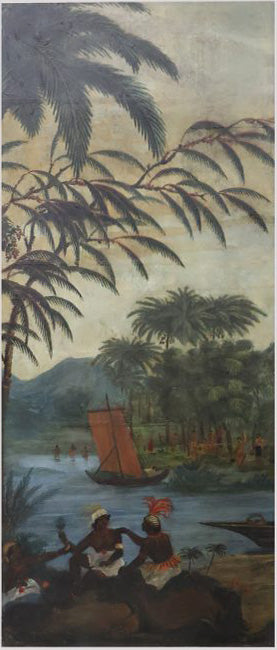from: A Monumental Pacific Panorama: Five Grand Decorative Panels After Cook’s Voyages
Joseph Dufour. Polynesians. 1804.
Joseph Dufour. Polynesians. 1804.
Couldn't load pickup availability
Joseph Dufour et Cie (est. 1797)
Polynesians
From: *“Les Sauvages de la Mer Pacifique” or “Les Voyages du Capitaine Cook”*
Designed by Jean-Gabriel Charvet (1750–1829)
Mâcon and Paris, France: 1804–1805 Block-printed wallpaper
Dimensions: 69" x 29"
This elegant vertical panel from Les Sauvages de la Mer Pacifique offers a tranquil yet deeply evocative vision of Polynesian island life, centered on themes of maritime mastery, communal life, and environmental harmony. The composition is framed by soaring palms and soft horizon lines, giving way to a calm lagoon where a red-sailed
canoe glides peacefully across the water. On the near shore, three seated figures engage in quiet conversation, while groups of islanders gather in the background — some wading, others walking beneath the trees, all absorbed in the rhythms of daily life.
The serenity of the scene belies its deeper narrative: this is a portrait of a society fully attuned to the ocean, one whose way of life was shaped by tides, stars, and ancestral knowledge passed across generations. Charvet’s depiction emphasizes this unity — between people, land, and sea — through compositional balance and a soft palette that conveys both intimacy and grandeur.
Historical and Cultural Context: This panel is a direct homage to the extraordinary navigational achievements of Polynesian cultures, which stunned European observers during the age of exploration.
• Captain James Cook, who voyaged across the Pacific three times, was consistently astonished by the Polynesians’ ability to traverse vast distances using no written maps or compasses — relying instead on a sophisticated understanding of wind, wave patterns, stars, and oral tradition.
• Cook and his scientists recognized Polynesians as master seafarers and were among the first Europeans to advocate for their technical and cultural brilliance, challenging earlier assumptions of Indigenous inferiority.
Though idealized through a neoclassical French lens, this panel preserves a genuine admiration for the Polynesian relationship to the ocean. It portrays not just transportation or labor, but a worldview — one in which mobility, cooperation, and cosmological knowledge are central. With its gentle pacing and harmonious detail, this panel stands as a tribute to Polynesia’s enduring legacy as a civilization of explorers, stewards, and storytellers.


